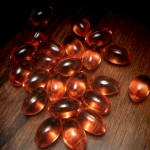 Vitamin E is a collection of eight phenolic compounds which share the activity of α-tocopherol. Four of these compounds are tocopherols (α-, β-, γ- and δ-tocopherol), and four of these compounds are tocotrienols (α-, β-, γ- and δ-tocotrienol). The primary form of vitamin E in human plasma is α-tocopherol, because this is the favoured form for packaging into lipoproteins in the liver. Vitamin E has been researched extensively with regard its ability to protect humans from cardiovascular disease and atherosclerosis. Based on previous work demonstrating an antioxidant and cardioprotective effect of vitamin E, researchers investigated the effects of palm oil distillate containing 40 mg of γ-tocotrienol and α-tocotrienol, and 16 mg α-tocopherol on the progression of carotid stenosis1. Baseline measurements of the occlusion in the carotid arteries were measured using ultrasonography and repeated at 3, 6, 9, 12 and 18 months. Subjects showed levels of occlusion ranging from 15 to 79 % prior to commencement of the study.
Vitamin E is a collection of eight phenolic compounds which share the activity of α-tocopherol. Four of these compounds are tocopherols (α-, β-, γ- and δ-tocopherol), and four of these compounds are tocotrienols (α-, β-, γ- and δ-tocotrienol). The primary form of vitamin E in human plasma is α-tocopherol, because this is the favoured form for packaging into lipoproteins in the liver. Vitamin E has been researched extensively with regard its ability to protect humans from cardiovascular disease and atherosclerosis. Based on previous work demonstrating an antioxidant and cardioprotective effect of vitamin E, researchers investigated the effects of palm oil distillate containing 40 mg of γ-tocotrienol and α-tocotrienol, and 16 mg α-tocopherol on the progression of carotid stenosis1. Baseline measurements of the occlusion in the carotid arteries were measured using ultrasonography and repeated at 3, 6, 9, 12 and 18 months. Subjects showed levels of occlusion ranging from 15 to 79 % prior to commencement of the study.
The results showed that seven of the experimental group showed regression of carotid stenosis and two showed progression. However, in the placebo group none of the subjects showed regression, while 10 of the subjects showed progression. Subjects in the experimental group approximately doubled their serum α-tocopherol levels from baseline to 18 months and also demonstrated reductions in lipid peroxidation. In contrast, the placebo group showed no significant changes to either parameter. Both groups showed a reduction in platelet aggregation, perhaps as a result of taking the prescribed medicine aspirin during the study. Neither group displayed any changes to serum lipids during the study, further emphasising their lack of importance in the progression or regression of atherosclerosis. The authors concluded that the reduction in stenosis of the carotid arteries as seen in the experimental group, may have been due to the reduction plasma lipid peroxidation levels, a viewpoint which is supported by other studies.
RdB
